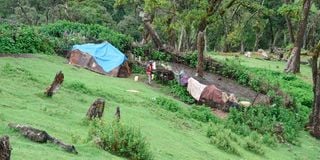Premium
Government defends decision to evict Sengwer community from Embobut forest

A tent belonging to Kiplagat Kirotich, who lives at Kipsitona village within Kapkok Glade in Embobut Forest, Elgeyo Marakwet County on May 02, 2024, which he erected after his house was allegedly burnt by Kenya Forest Service rangers on Wednesday. About 200 houses were bunt in an eviction exercise.
What you need to know:
- The Ministry of Environment and Forestry on Tuesday maintained that the removal of more than 600 families from the forest complex was aimed at protecting Cherangany water towers from further degradation.
- This is due to unlawful logging, agricultural activities, and unregulated fencing of the forest land for commercial grazing and charcoal burning.
The government has defended the forceful eviction of hundreds of members of the endangered Sengwer community from Embobut forest in Elgeyo Marakwet County, accusing them of degrading the important water tower.
The Ministry of Environment and Forestry on Tuesday maintained that the removal of more than 600 families from the forest complex was aimed at protecting Cherangany water towers from further degradation, due to unlawful logging, agricultural activities, and unregulated fencing of the forest land for commercial grazing and charcoal burning.
According to the North Rift Head of Conservancy, Anthony Musyoka, the squatters were asked to voluntarily move out of the forest ahead of the operation.

Anthony Musyoka, Kenya Forest Service Head of Conservancy in North Rift region, during an interview in Eldoret town, Uasin Gishu County on May 07, 2024, over the ongoing evictions at Embobut Forest in Elgeyo Marakwet County. He claimed all squatters were compensated by the government in 2013 where 2874 families each got Ksh410,000. Those residing in the forest claim they did not get government compensation in 2013.
“The squatters are involved in uncontrolled agricultural activities in the forest causing massive destruction to the ecosystem and destruction of the entire water towers,” said Mr Musyoka.
He dismissed claims by the indigenous Sengwer community that the evictions contravened a Court of Appeal order issued in 2021, which directed maintenance of the status that no new persons should occupy the forest land.
“The conservatory orders were violated by the Sengwer and Marakwet clans, who began trooping back to the forest in 2021 to secure forest glades, and further subdivide the forest into individual paddocks for commercial hiring,” said Mr Musyoka.
The Kenya Forest Service (KFS) has deployed 170 forest protection and security personnel to carry out the one-month-long operation to forcefully evict members of the Sengwer community and other squatters from the forest land.
The community members have written to Cabinet Secretary for Environment, Climate Change and Forestry, Soipan Tuya, petitioning the government to suspend the operation to allow dialogue on how to resolve the contentious matter.
The families, who are in makeshift camps in parts of Marakwet East Sub-County, have termed the repeated evictions as a disaster that has exposed them to a lack of shelter and food, as well as pitiable hygienic conditions that are likely to result in an outbreak of infectious diseases.

Benjamin Ruto, who lives at Kipsitona village within Kapkok Glade in Embobut Forest, Elgeyo Marakwet County, inside his burnt house on May 02, 2024.
“These evictions have hit us hard during the rainy season and calamities caused by flash floods. We have nowhere to shelter after our homes were razed down, foodstuff reduced to ashes, while the young and the elderly are exposed to unhygienic conditions that will compromise their healthcare,” said Paul K Kitum, Chairman of the Sengwer Council of Elders.
Embobut forest was declared a public forest in 1954 and the government has carried out repeated evictions to move out the indigenous community, who claimed a share of the forest and that they are the best protectors and conservators of the environment.
“As an indigenous community, the government has failed to recognise our rights as true shareholders of these forests. We are being humiliated in our own homes despite being upright at protecting the environment,” said Benjamin Chelimo, a father of 10 from Kipsitona village.
They are part of 2,874 squatters, who were given Sh410,000 each in 2013 to buy alternative land to settle on, but have encroached on the forest that forms part of the larger Cherangani Hills ecosystem, one of the country’s water towers.
“Most of the Sengwer were left out of the compensation process and in any case how can one start a new life with the Sh410,000 away from the ancestral home,” said Joseph Lopeta, one of the victims.
The government through KFS has in the past carried out a series of forceful evictions of squatters from Embobut forest.
Suspected bandits in 2019 burnt a KFS conservation station neighbouring Embobut Forest, which is part of the Cherangani water tower. The 12 KFS officers manning the station escaped unhurt during the protracted attack over the illegal occupation of the forest.
The community members have dismissed claims by KFS that they are involved in the destruction of the public forest.
“We are committed to working with KFS and relevant authorities to restore and protect Embobut forest. KFS should however remove non-Sengwer, who have encroached into our forest land and are carrying out destructive illegal activities,” said Elias Kimaiyo, a human and environmental activist.
Kapyego ward Member of County Assembly, Joseph Loiwalan, called for dialogue in resolving the repeated evictions and conservation of the forest.
“KFS needs to have dialogue with the Sengwer community in the conservation efforts of the forest instead of the repeated evictions that have proved to be counterproductive,” said Mr Loiwalan.
The Sengwer community is one of the remaining forest-dwelling people who occupy part of Cherangani Hills, but their way of life is threatened with extinction due to the degrading of the forests.
They moved to the East African Court of Justice in Arusha, Tanzania, which ruled in their favor and called on the Government of Kenya to end the evictions and settle the Sengwer in the forest.





